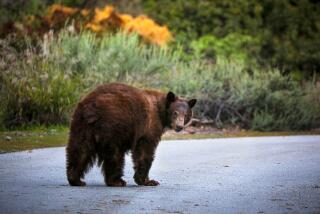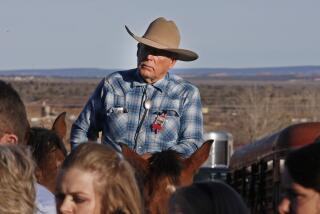Seeking Coexistence With Predators
- Share via
BILLINGS, Mont. — While some of their neighbors opposed reintroduction of the Mexican gray wolf, Arizona cattle producers Will and Jan Holder came to embrace it. For them, it provided a new marketing opportunity and the prodding to manage their operation in a way that benefits both predators and a ranching lifestyle in the West.
The Holders are part of a still-small group of livestock and wool producers considered predator-friendly. They view peaceful coexistence with predators such as wolves as a basic principle, sound business decision and potentially profitable selling point to consumers.
Their approach goes beyond that of many other ranchers in the West willing to tolerate predators to a certain point: The Holders are among those who have refused to take lethal measures against predators -- even those that might kill livestock -- and instead change their practices to try to avoid conflicts.
“We don’t believe it solves anything by killing a predator, and we like to see wildlife,” said Jan Holder, whose family runs a cattle ranch in eastern Arizona and has encountered such predators as mountain lions, coyotes, bears and wolves.
But some livestock industry leaders view this predator-friendly approach warily, seeing it as little more than a novel, niche-marketing opportunity unlikely to gain much footing in the West, where predators are a regular, sometimes costly way of life for producers.
“How would you like it if I came up every few weeks and pulled $500 from your wallet? That’s pretty much what wolves do when they kill a calf,” said Steve Pilcher, executive vice president of the Montana Stockgrowers Assn. “Ranchers are going to have to get a pretty hefty premium to offset that cost.”
Helping predator friendly ranchers command a premium price on products such as meat or wool is the idea behind a certification program administered by the Predator Conservation Alliance in Bozeman.
Certified ranchers -- there are only about a dozen so far, scattered from Arizona to Washington state to Vermont -- can use a special brand with track marks in advertising and on certain products, said Janelle Holden, program director with the alliance.
The brand cannot be placed directly on meat because of federal labeling requirements, she said. But it can appear on signs at markets and on restaurant menus, as well as on wool goods.
The idea is to give discriminating consumers with an environmentalist tilt another reason to buy the products, often already raised organically or naturally, she said. The program is too new to say how much of a premium the tag might draw on the market.
“At this point, no one’s really saying, ‘Buy my beef because we don’t kill coyotes,’ but ‘Buy my beef because it’s good for you and the environment,’ ” she said.
For the Holders, part of raising a healthy product and protecting, even enhancing, rangeland conditions is recognizing the role played by predators -- in helping keep rodents in check, for example -- and managing their ranch to accommodate it.
Their cattle are no longer dehorned and are often moved, like the chickens, to keep them from being easy targets for predators. Often, someone will camp with the cattle in hopes that the human presence will help keep predators away.
The family also buys cattle from like-minded producers for Ervin’s Grassfed Beef, their company, which shuns the use of antibiotics or hormones in cattle production and notes their predator-friendly status.
Jan Holder believes that had they not taken these routes and changed the way their family ranched, they would have had to sell off.
“There are a whole lot more people that care about wildlife more than cattle ranching; that’s reality,” she said. “We’re outnumbered. And unless we make changes, our lifestyle will cease to exist.”
Conservationists like Nina Fascione at Defenders of Wildlife praise a predator-friendly philosophy that promotes coexistence and a greater understanding between the ranching and conservation communities. She said her organization, which helps ranchers implement practices to help reduce conflict, had supported predator “management” if nonlethal measures were first exhausted.
Some certified practitioners admit that the approach may not be for everyone, and Jan Holder said they might consider lethal action if faced with a “deviant” animal. Having a predator killed, regardless of the circumstances, would result in certification being revoked, Holden said.
“If we set it up so you could kill an animal every now and then, it’s not really predator-friendly,” she said. Her group took over the program about a year ago from one that included ranchers and conservationists and is trying to breathe new life into it.
Making a financial go of predator-friendly status is hardly assured. The Holders and Montana sheep rancher Becky Weed have been successful, Holden said, but have also tapped niche natural or organic markets. How big a part predator-friendly status played in that, she can’t yet say.
Holden sees a potential for growth in the certification program, noting interest from producers like Mike Stevens in Idaho. But she also sees challenges to that, such as marketing, distribution and ensuring ample production to meet demand. One goal, she said, is forming a cooperative of producers interested in marketing together.
“I think that those already involved are committed to this and that has less to do with an economic benefit than their belief in this lifestyle,” she said. “As we can prove an economic benefit, I think others may jump on the bandwagon.”
Stevens considers a predator-friendly philosophy that includes nonlethal steps -- such as the presence of herders and guard dogs -- to protect his sheep. But from a business standpoint, he believes that certification could help in marketing lamb.
One concern he has is being faced with chronic predation and significant losses, but he said he hasn’t had a situation yet when losses could prompt federal wildlife officials to recommend killing offending predators.
Weed has had losses. This year, she said, foxes killed some lambs on her ranch near Bozeman. In that situation, she said, it’s difficult to have “warm, fuzzy feelings” for the predators.
But Weed, who runs Thirteen Mile Lamb & Wool Co. and is certified predator-friendly, said she set aside her emotions to look at the bigger picture, one in which she sees coexistence with wildlife as a privilege and responsibility, and their presence part of what makes living in the region special.
“This is not a romantic, cute notion to me. This is a deep-seated belief of the role of wildlife on the landscape,” she said. “And I believe it’s possible to figure out ways to cope with it.”
More to Read
Sign up for Essential California
The most important California stories and recommendations in your inbox every morning.
You may occasionally receive promotional content from the Los Angeles Times.










